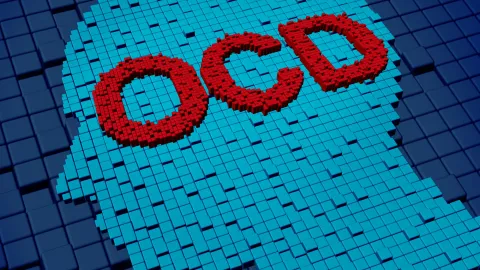Worrying too much can be a sign of OCD in teenagers. Here are some crucial signs that signify you may have OCD and need to take OCD medication.
Obsessive-compulsive disorder, or OCD, is a mental health disorder that affects approximately 1 in 40 adults in the United States. That’s about 2.3% of the population. While OCD can manifest in different ways for different people, there are some common signs and symptoms to look out for. If you think you or someone you know may have OCD and need to take OCD medication, read on for more information.
Hand-washing
One of the telltale signs of OCD is excessive hand-washing. People with OCD may wash their hands dozens of times a day, or after every minor task or contact with an object. They may have strict rules about how to wash their hands, such as using a specific soap, water temperature, or number of scrubbing motions.
People with OCD may also avoid shaking hands or touching doorknobs and other objects for fear of contamination. In severe cases, they may refuse to leave their home for fear of coming into contact with germs.
Overzealous Cleaning
If you’re someone who likes to keep their space clean and tidy, that’s perfectly normal. But if you find yourself spending hours cleaning and re-cleaning your home or office until it’s spotless, you may be suffering from OCD.
OCD, or obsessive-compulsive disorder, is a mental health condition that can cause people to fixate on certain thoughts or behaviors. For some people with OCD, this means constantly cleaning their space in an attempt to ward off germs or other contaminants.
If you think you might have OCD, it’s important to seek professional help. Therapy and OCD medication can both be effective treatments for the condition.
Checking Behavior
If you find yourself frequently checking things- whether it’s making sure the doors are locked or that the stove is turned off- it may be a sign of OCD. People with OCD often have intrusive thoughts about potential dangers or harm coming to themselves or others. As a result, they may feel the need to check things in order to reduce their anxiety and fear. Checking behaviors can interfere with daily activities and cause significant distress. If you’re struggling with compulsive checking, it’s important to take OCD medication or seek professional help.
Counting
If you are preoccupied with numbers or counting, it may be a sign of OCD. This can manifest in a few different ways. For example, you may find yourself compulsively counting objects, like stairs or steps. Or you may have to count in a certain way, like only even numbers or multiples of three. You may also have intrusive thoughts about numbers or counting. For instance, you might worry that if you don’t count a certain number of times, something bad will happen. Counting can also be part of a ritualistic behavior, like tapping or hand-washing. If you’re concerned that your counting habits are impacting your life in a negative way, it’s important to take OCD medication and talk to a mental health professional.
Organization
If you have OCD, you may find yourself overly concerned with organization. You may feel the need to keep your belongings in a certain order or arrangement, and become upset if they are not. You may also feel the need to organize your time, schedule, and activities in a rigid way. This can make it difficult to cope with change or uncertainty.
Fears of violence
If you have OCD, you may be afraid of violence. This can include thoughts of hurting yourself or others. You may also be afraid of being hurt by someone else. This can make it hard to leave your house or be around people. If you have these fears, it’s important to get help from a mental health professional.
Unwanted Sexual Thoughts
If you’re struggling with OCD, it’s likely that you’ve experienced unwanted sexual thoughts, also known as “pure obsessional” or “sexual intrusive thoughts.” These obsessions can take many different forms, and they can be extremely distressing and disruptive. Here are some signs that you may be experiencing unwanted sexual thoughts:
-You have frequent, intrusive, and graphic sexual thoughts that you can’t seem to control.
-You find yourself avoiding certain people or places because you’re afraid of having sexual thoughts about them.
-You feel disgusted or ashamed of your sexual thoughts, and try to keep them hidden from others.
-Your sexual thoughts interfere with your work, school, or personal relationships.
-You engage in compulsive behaviors (such as excessive hand-washing) in an attempt to rid yourself of sexual thoughts.
If you’re experiencing any of these symptoms, it’s important to take OCD medication. OCD can be a very debilitating condition, but there are treatment options available that can help you manage your symptoms and regain control over your life.
Dwelling On Relationships
It’s not uncommon for people with OCD to spend a lot of time dwelling on their relationships. Whether it’s wondering if they’re good enough for their partner or if their partner is really as committed as they say they are, people with OCD can’t help but overthink things when it comes to relationships. Here are some signs that you may be dwelling on your relationships a little too much:
-You find yourself constantly questioning your partner’s commitment to you.
You’re always second-guessing yourself in your relationship.
-You’re always worried about what could go wrong in your relationship.
If you find yourself obsessing over your relationship, it’s important to take OCD medication or seek help from a mental health professional. They can help you work through your fears and anxiety so that you can have a healthy and happy relationship.
Seeking Reassurance
If you find yourself seeking reassurance from others constantly, it may be a sign that you have OCD. This can manifest itself in many different ways, such as always needing to know what someone else thinks about a certain topic or situation, or needing constant reassurance that you’re doing something right.
This need for reassurance can interfere with your life in a number of ways. It can make it difficult to make decisions, as you’re always second-guessing yourself and looking for someone else’s approval. It can also lead to problems in relationships, as you may be overly dependent on others for validation and support.
If you think you might have OCD, it’s important to take OCD medication as soon as possible. A mental health professional will be able to assess whether your symptoms are due to OCD or another condition, and provide treatment that can help reduce your anxiety and improve your quality of life.
Conclusion
If you identify with any of the signs and symptoms mentioned in this article, it is important to get OCD medication. OCD can be a very debilitating disorder, but there are treatments available that can help you manage your symptoms and live a normal, productive life. Don’t suffer in silence — reach out for help today.


